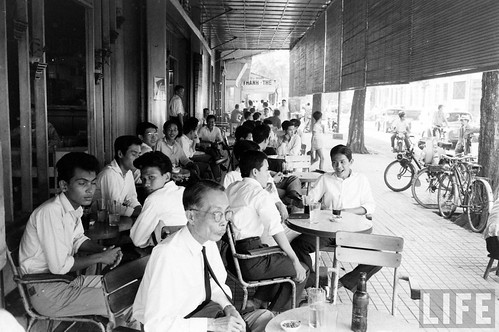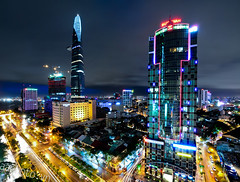Vietnam
Today, Wikipedia, Google, and many other high profile websites are protesting the MPAA's Protect IP Act (PIPA, in the Senate) and the Stop Online Piracy Act (SOPA, in the House), two anti-piracy acts that they're trying to push into legislation in the US, which also threaten internet freedom. Citizens of other countries should be concerned not just because much of the internet each of us uses runs in the US and so abides by US law, but because the wording that eventually passes will likely be copied by governments around the world.
Netizens in Vietnam have joined the cause or at least have spread word in support. Stepping back, doing so is an act of irony from multiple perspectives.
First, that we're protesting at all in a country where public protest is a privilege more than a right, that the Communist Party is seldom willing to confer. In this case, there's little concern for the Party, since the object of protest is in America, and it's specifically an industry (Hollywood) which clearly gets no respect here - it's more convenient to buy pirated DVDs, two for a dollar, publicly on the street at tax-paying (or whatever it is they're paying, to whoever) businesses, than it is to download them online anyways.
Next, we're protesting because we don't want arbitrary websites to be taken down by the law without any due process. If you're at all familiar with Vietnam's legal system, you'll already know that this is the case here. Nominally, pornography is banned and this is why the government can block websites but if there are any porn sites that are blocked I'm not aware. If IP laws were enforced here, Zing would not exist. But some websites are taken down occasionally.
And finally, we're using social media as our protest medium. Social media and web technology make it really easy to join a protest; it only takes two clicks to share something on Facebook. Except that Facebook itself is already "blacked out" in Vietnam. And Facebook is by far the most commonly used form of social media in Vietnam. And the protest is about internet censorship.
The point I want to make is that internet freedom is valuable and is a worthwhile cause for all people. For the people who are just now thinking about internet censorship issues, I hope they also become aware of it in a more immediate context, like a campaign to help starving Africans should also serve to bring about greater awareness of poverty closer to home.
Happy 2012!
Despite one of FPT's divisions signing a contract with Facebook to be a Facebook developer partner in Vietnam, unlike what many folks here in Vietnam had hoped, it did not mean that FPT would keep access to Facebook flowing freely. Facebook isn't actually banned in Vietnam, it just suffers from "technical difficulties" from time to time that nobody seems to bother to investigate for the millions of users in Vietnam. So businesses still advertise and do business using Facebook as a platform. Even the State uses Facebook, with the Vietnam Administration of Tourism stating they will campaign on Facebook. I suppose they don't mind if only people outside of Vietnam can see the ads, even if most tourists in Vietnam come from Vietnam.
There are a number of theories as to why it's sometimes difficult to access Facebook in Vietnam. In China, it's outright banned. In Cambodia, it's just really slow, but otherwise doesn't suffer the same "technical difficulties" despite using the same Internet service providers as Vietnam (as Vietnamese telecoms serve as uplinks to Cambodian ISPs). Some of the conspiracy theories include pressure from rival social networks like Zing Me or the government's own Go.vn, or that Facebook is blocked due to not paying taxes.
As of right now, FPT has started making it "technically difficult" to access Facebook, whereas Viettel seems to be okay, and VNPT is hit or miss (currently it is working on this VNPT connection), Mobifone is a no go. The usual method of changing your /etc/hosts file or your DNS will no longer work. Using apps like HotSpot Shield, VPNs, proxies, and SSH tunnels will always work. You can also use various apps including Seesmic or Hootsuite to access both Facebook and Twitter at the same time.
So if you don't want to play musical chairs with your ISPs as each one opens/closes access to Facebook, be sure to have one of the above in your arsenal of freedom.
If your ISP is blocking Facebook then you must use a general workaround such as Hotspot Shield (spammy) or a VPN like StrongVPN.
BarCampSaigon Winter 2011 was a success by most measures, comparable to the previous one. There were a lot of registrations, a lot of attendees, and a lot of sessions. We fed, clothed, and caffeinated hundreds of people and found sponsors willing to pay for it all. We didn't lose money (making money isn't possible, but losing money is). Yet something about it has been bothering me since last Sunday.
Barcamping is easy; Easy to attend; Even easy to organize.
Yes, it can be easy to organize a BarCamp. But, I think, it's really difficult to organize BarCamps (plural).
For one, most people who like the idea of organizing a BarCamp like the idea exactly once. It's hard to keep the fire going. The first BarCamp Saigon flame nearly died out - some embers turned into a second generation. But BarCamp Hanoi's flame has already disappeared. These are unrecognized failures.
The problem, as I see it, is that this BarCamp didn't necessarily ensure that another BarCamp would happen, and I think just continued to fuel the myth among people that BarCamps will happen magically and automatically, that they will get a free meal and t-shirt again. After some thought, these three distillations occurred to me:
1. barcamp should beget barcamp.
2. barcamp should be the beginning - not the end.
3. barcamp should be the exception - not the rule.
So let me explain.
1. BarCampSaigon should be the genesis of the next BarCampSaigon, and also BarCamps in other Vietnamese cities - BarCampCanTho, BarCampDaNang, BarCampDaLat. People should understand what a BarCamp is enough to organize simple ones in their hometowns, and do it without worrying about significant funding or caring how many people will show up. Clothing and caffeination optional.
2. Things should start at BarCamp. Ideas should be formed and relationships forged out of discussions among people who should have been meeting more regularly but hadn't. It shouldn't be a place to launch or announce your finished product, although if you started from a previous BarCamp that would be thrilling news. Sessions should not just lead to greater understanding, but cause new questions and avenues of inquiry to be developed.
3. BarCamp is the unconference. But it's also become the premier tech conference in Saigon. I think there should be large tech conferences here covering the major topics that are presented on at BarCampSaigon. And BarCampSaigon should be the place for importing new foreign and emerging ideas, which should then one day get full conferences of their own, so that BCSG can be a platform for further more ideas which need sharing.
These three goals aren't officially BarCamp's raison d'etre, nor are they the only important ingredients in a BarCamp. The meat of the camp does matter: the number and quality of sessions and people leading them so that people buzz about the next BarCamp; food and coffee and beer to get people to sit down communally; design of t-shirts and other assets to make the event come off professional; and convincing sponsors to make it all happen. I would like to have more thoughts about how those ingredients can coincide with the above three ideas.
UPDATE: Startup Weekend Ho Chi Minh City 2012 is happening this weekend, starting tonight (Friday September 14) and commencing on Sunday the 16th. The "hacking" venue is The START Center For Entrepreneurs on Nguyen Thi Minh Khai, and final presentations and judging will be at Intercontinental Hotel. This year again I'll be a coach/mentor for the aspiring young entrepreneurs.
--
If you missed it, a few weeks ago the global Startup Weekend competition came to Ho Chi Minh City (which we all know is Saigon). There have been a number of such startup idea pitching competitions in both Saigon and Hanoi recently. I was able to take part in StartupWeekend here in the capacity of a mentor. This meant I could walk around to each team while they were working on their ideas and give suggestions. Suggestions were not so much about the core idea, which was already set, or how to legally incorporate, which was too early, but how to strengthen the business case for the idea, improve implementation, create a better presentation (presentation is seriously important), and suggest alternative markets and competitors which they may not have been aware of.
The event takes place over 54 hours (a weekend starting from Friday night) in which first ideas are pitched, then filtered into the most popular ones. In the end there were about a dozen ideas which the initiators could then gather team members from those whose ideas weren't chosen or came just to join a team.
In the end, these teams gave presentations before a live audience (including representatives from the media). I didn't see much coverage of the actual pitches of the event so I'd like to record them here.
Read the rest of this article...This post comes out of a conversation I had with my friend Prithvi, who has years of experience in the outsourcing industry both here and in China and other countries.
Outsourcing is a huge industry here in Vietnam. It solves several problems for Vietnam. First, it brings in much needed income. Second, it does so without requiring a high ratio of expensive imported inputs (compare this to making shoes which are exported for a cheap price, but most of the costs come from materials which must be imported). Third, it helps advance domestic use of technology, which should make all industries more efficient.
Read the rest of this article...This past weekend was the third annual Saigon MobileDevCamp held at Bach Khoa University. Although I'm mainly a web developer, as the event was billed as a brother to BarCamp, I decided to go and check it out, meet some people, support my friend Dan, and see if anything from the event could be applied to the upcoming BarCamp Saigon on December 11th.
Like BarCamp, the venue is a local university. However, the quality of facilities between a regular Vietnamese university like Bach Khoa and a foreign-operated campus like RMIT are on a quite different level. Most rooms were without air conditioning and became quite hotter than I'm accustomed to. In the morning there were a number of sessions on developing mobile apps (I checked out a session on PhoneGap but missed the Unity 3D session). In contrast to the BarCamp ideal, guest speakers were invited to give sessions which were planned and scheduled beforehand. Topics were confined to the "mobile development" theme.
After lunch, the main event would be a 24-hour coding competition. As I was already waking up far earlier than usual to attend the conference which I hadn't even properly registered for, I had no intention of joining the hackathon but I would eventually be overcome by my friend Cong's excitement for Doing Things.
So that's it. We lost. We learned some lessons.
1. Be one of the first to present if you can.
2. Don't single out and alienate judges.
3. Don't build clean, well-architected software with maintainable code. In real life, this matters. For this competition, it doesn't.
The greatest tragedy perhaps (besides not winning) was that the presentations were all made in private with the judges. Having groups present their apps for everyone to see, or at least putting them somewhere online, would have been the BarCamp way. As we didn't receive any feedback or anything from the judges, it would have been nice to share what we all worked on for 24 hours (multiplied by nearly 100 people) and be able to learn from others' experience. Even if there wasn't time for all to present, I don't think I was the only one interested in seeing at least the demos from the winners.
- tomo's blog
- Login to post comments
- Comments
Having just gone back to the United States for a week, here are some reasons why I no longer live ther. I didn't move abroad because of these reasons, but now that I'm living in Vietnam, these are some of the reasons why I won't move back.
1. Lawn-mowing. I'm allergic to not only the job of mowing lawns and the grass clippings and plant matter that gets tossed into the air, but now the sound itself puts me on edge. Somehow all the dust in the air and sound of motorbikes in Saigon doesn't have the same effect.
Read the rest of this article...If you read much English-language Vietnamese news online, you'll often read this conclusion and chuckle silently: "Police are investigating."
These are crime stories and you may imagine to yourself that police are investigating, how they're looking for clues (cue CSI: Saigon), and at what point they conclude their investigation conclusively. (There are far fewer followups in the papers.)
There's a new Tumblr about this phenomena of police investigating things. A sample:
[Sorry, the link went down.]
Police are investigating all sorts of claims. Even children's arithmetic puzzles.
Seriously, every quote from the police: "we are investigating". Here is a bunch of random samples from recent news articles at Tuoi Tre:
Read the rest of this article...
Looking at photographs of pre-1975 Saigon always make me wonder how differently things could have turned out had South Vietnam and North Vietnam remained separate countries. Would South Vietnam be as developed, modern, and affluent as South Korea is today compared to the starving citizen-prisoners of the Hermit Kingdom? If you've seen old photos of both Hanoi and Saigon you'll notice that even then Saigon was much more modern, cosmopolitan, and affluent compared to Hanoi.
In some ways, today we haven't really changed all that much since 1975, if you ignore the forward and backwards steps in the two decades after the war ended. The streets are still recognizable, mostly they've just changed names. Freedom has been replaced with Revolution. The black and white renditions of wooden cafe seats are even nicer than the red or blue plastic chairs I'm often in today.
Anyways, I've been looking over the 245 photos of 1961-era Saigon scanned in from Life magazine all weekend. I hope you enjoy as much as I did, even if loading them takes awhile.
A map shows the train used to terminate at Ben Thanh market. Saigon had grade-separated highways back in 1961.

Saigon.

The internet speed in Vietnam is back to dialup level. There are rumors of another cable cut as well as maintenance that will last more than another week. This after weeks of "undersea cable maintenance" after which we had awesome download speeds for awhile. This means a lot of large transfers from sites outside of Vietnam are unbearably slow. In the meantime, go buy your favorite movies or TV shows on DVD for 10,000 VND, it'll be quicker.
There is a time of day when speeds are much better. It's in the wee hours of the morning, when most of the population has stopped downloading porn for the day.
If you're slightly resourceful you can take advantage of that window of high speed internet by downloading to a server outside Vietnam during the daytime and then downloading from there to your home PC at nighttime.
Read the rest of this article...
Recent comments
1 year 11 weeks ago
2 years 3 days ago
2 years 1 week ago
2 years 3 weeks ago
2 years 19 weeks ago
2 years 19 weeks ago
2 years 19 weeks ago
2 years 19 weeks ago
2 years 19 weeks ago
2 years 19 weeks ago